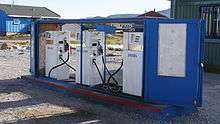KNI A/S
_Logo.gif) | |
| Government-owned corporation | |
| Industry |
Retail Public services Beverage Liquid fuels Lubricants Service |
| Predecessor | Royal Greenland Trading Department (KGH) |
| Founded |
KGH: 1774 Kalaallit Niuerfiat: 1986 KNI: 1992 |
| Headquarters | Sisimiut, Greenland |
Area served | Greenland |
Key people | Peter Grønvold Samuelsen |
| Revenue | DKK 1,314,916,000 |
| DKK 70,643,000 | |
Number of employees | 804 |
| Subsidiaries |
Neqi & KNI Ejendomme (100%) Akia Sisimiut (82.5%) |
| Website | kni.gl |
|
Footnotes / references (2011[1]) | |
KNI A/S or Greenland Trade[2] (Greenlandic: Kalaallit Niuerfiat, Danish: Grønlands Handel) is a trading conglomerate in Greenland. It is the successor to the Royal Greenland Trading Department, which controlled the government of Greenland itself from 1774 to 1908 and possessed a monopoly on Greenlandic trade from 1776 to 1950. Today, the company remains a major component of the Greenlandic economy and remains fully owned by the local government.[1] The company is based in Sisimiut (Holsteinsborg), Greenland's second-largest city, located in mid-western Greenland's Qeqqata Municipality.[3]
History
The Royal Greenland Trading Department (Den Kongelige Grønlandske Handel, KGH) was founded in 1774 as a Dano-Norwegian state enterprise charged with administering the Danish settlements and trade in Greenland. In the early 20th century, most of its administrative functions were lost to the Danish Ministry of the Interior and the company's monopoly was finally ended in 1950. Following the establishment of the Home Rule Government in 1979, control of KGH was ceded in 1986[4][5] and the company was reorganized as Kalaallit Niuerfiat.[6] This was then reorganized into the KNI conglomerate in 1992.[7]
The conglomerate's fishing operations were spun off as Royal Greenland A/S in 1990 and its shipping operations as Royal Arctic Line A/S in 1992. On January 1, 1993, KNI was restructured into a holding company KNI-mik Piginnittut and two subsidiaries, KNI Pisiffik and KNI Pilersuisoq, both including aspects of the parent company's retail division.[8] KNI Pisiffik was based in Greenland's larger towns and was an experiment in running the stores without government subsidy; KNI Pilersuisoq was located in the more distant and less populous towns and was understood to require public underwriting. Pisiffik A/S was then spun off in 2001[9][10] and the competition between the two chains blossomed into a price war after KNI opened a discount Pilersuisoq in Aasiaat in 2008,[11][12] even though both companies were state-owned at the time (A majority stake in Pisiffik has since been sold to Dagrofa, a Danish food concern).

Divisions
Pilersuisoq
Since the initial experiment, KNI has folded Pilersuisoq back in as a division of the parent company. It continues to operate a chain of all-purpose general stores in remote locations under government subsidy (roughly DKK 40m per year[1]) as well as some smaller towns still unserved by Pisiffik or the newer entrant Brugsen. It also operates some Post Greenland and Bank of Greenland offices,[13] manages duty-free stores at Kangerlussuaq and Narsarsuaq Airports,[14] and services for Air Greenland related to helicopter flights to and from the smaller settlements.
Polaroil
Another division is the company's liquid fuel distribution network, Polaroil, which employs 70 full-time-equivalent staff and operates 70 stations across Greenland.[15] The removal of its headquarters from Maniitsoq to Sisimiut in 2010 provoked protests from the small community already experiencing depopulation.[16]
Subsidiaries
The company wholly owns two subsidiary companies – Neqi A/S and KNI Ejendomme A/S – and has a strong majority stake (82.5%) in a third – Akia Sisimiut A/S.
Neqi
Neqi A/S is another grocery store chain, selling fish and meat along with Greenlandic produce made economical through guaranteed purchasing provided by KNI on behalf of the Greenlandic government.[17][18][19] The principal slaughterhouse is in Narsaq.
KNI Property
KNI Ejendomme A/S is a wholly owned subsidiary which manages KNI's real estate holdings and investments.
References
- 1 2 3 KNI. "Interim Report". Sept 2011. Accessed 30 Apr 2012.
- ↑ Greenland Home Rule. "About Greenland: Resources and Industry Archived 2012-02-23 at the Wayback Machine.". Accessed 30 Apr 2012.
- ↑ KNI. "Ledende medarbejdere" ("Executives"). Accessed 30 Apr 2012. (in Danish)
- ↑ MIPI. "Pilersuisoq KNI A/S". Accessed 2 May 2012. (in Danish)
- ↑ Dahl, Jens. Saqqaq: An Inuit Hunting Community in the Modern World. Univ. of Toronto Press, 2000.
- ↑ Culture Greenland. "Preliminary Studies in KGH's Photo-Archive". Accessed 2 May 2012.
- ↑ KNI. "Kort historie om KNI [A Short History of KNI]". Accessed 28 Apr 2012. (in Danish)
- ↑ Randburg.com. "KNI Holding A/S". Accessed 30 Apr 2012.
- ↑ Pisiffik A/S. "Om os". Accessed 28 Aug 2010. (in Danish)
- ↑ Kamikposten. "Hvad vil Pisiffik A/S?". 15 Mar 2001. Accessed 28 Aug 2010. (in Danish)
- ↑ Sermitsiaq. "KNI-formand afviser løftebrud". 4 Sept 2008. Accessed 28 Aug 2010. (in Danish)
- ↑ Sermitsiaq. "Butikskrig i Aasiaat". 11 Dec 2008. Accessed 28 Aug 2010. (in Danish)
- ↑ Bank of Greenland. "Historie". Accessed 27 Aug 2010. (in Danish)
- ↑ Pilersuisoq Dutyfree. "Kangerlussuaq/Narsarsuaq". Accessed 27 Aug 2010.
- ↑ KNI. "Polaroil". Accessed 27 Aug 2010. (in Danish)
- ↑ Sermitsiaq. "Ruth H. i oprør" 12 Jan 2010. Accessed 27 Aug 2010. (in Danish)
- ↑ Sermitsiaq. "Brugsen satser på grønlandske kartofler". 3 Aug 2007. Accessed 28 Aug 2010. (in Danish)
- ↑ Sermitsiaq. "En heldig kartoffel". 28 Aug 2010. Accessed 28 Aug 2010. (in Danish)
- ↑ KNI. "Neqi". Accessed 27 Aug 2010.